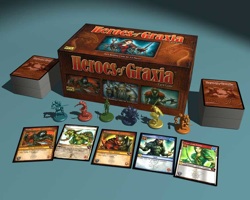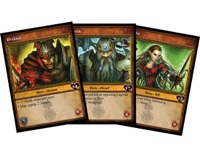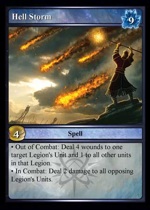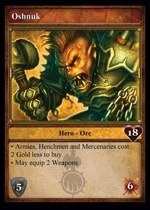
|
About OgreCave and its staff
|

|
by Lee Valentine
Heroes of Graxia (HoG) is a new deck building card game from Petroglyph designed by Daniel Kroegel. The game is set in the home-brewed fantasy world of Graxia. Magic-wielding generals called "Guardians" are the heroes who set out to recruit and arm their forces to send into war against rampaging monsters, as well as the armies of other players. Yes, that's right – there is finally a deck building card game with more than just a smattering of player versus player (PvP) interaction. PvP is a core element of HoG.
Gameplay HoG is not quite as fast to get setup as Ascension, but is faster to setup and reset than Dominion or Thunderstone. Players start out with a small standard deck of 12 cards, drawing a hand of five cards. In the middle of the table there is a market made up of three different decks: Spells, Legion Units, and Equipment. Four random cards are turned from the top of each of these decks to create a selection of potential things that players can buy and add to their decks. A fourth smaller deck filled with monsters is added to the table, and four monsters are flipped up. Monsters cannot be bought, but are instead there to be attacked by the players' Legions. Whenever a card is bought (or a Monster is destroyed), a new card from the corresponding deck is flipped up to keep four of each type of card on the table at all times. Unlike Dominion or Thunderstone, which have a static selection of market cards at all times, this combination of randomization and categorization keeps a little of everything on the table all the time, but requires constant reading and analysis on the part of the players.
During your turn you can make as many purchases as you can afford and you can take up to two actions. There's a long list of possible play options, but one of the core actions is attacking a Monster or another player's Legion. When Monsters are defeated they yield in-game rewards to the victor, and then they are sent off to his Loot Pile – they are not shuffled in to clutter up your deck as they are in Thunderstone. Combat is fairly standardized, whether you are attacking Monsters or Legions: Spells and combat-duration cards are activated, then the attack and defense scores of the opposing forces are compared. If your opponent has more attack than you have defense, your troops take Wounds. If any Unit takes more Wounds than their Health score they are destroyed. When fighting another player, if you lose a Unit your opponent wins Prestige. The game is played until one player has won a predetermined number of Prestige points, or until there are no more Monsters to be slain, whichever comes first. At the end of the game, players total the Trophy values of the Monsters they have slain, the other cards they have bought, and the Prestige points they have earned. The player with the highest sum of these points wins the game.
The game is generally fast-paced, but given that players can take at least two actions on each of their turns and can also buy as many cards as they can afford, there is some down time. The real down time comes during PvP combats. The battling mechanic is very math heavy (primarily adding and subtracting attack and defense modifiers). If you aren't involved in a combat, you could sit on your hands for five minutes waiting for a big battle to be calculated and resolved. This math can result in what my friends and I like to call a "math tax". If you fail to add up the values in your head before you declare an attack, or if you fail to calculate for the twelve point attack/defense swing that commonly occurs during combat due to the playing of Spells and Mercenaries, you will take an absolute pounding for your miscalculations. One noteworthy but odd feature in the game is that when someone is forced to pay the "math tax", the person who was defending tends to score quite a lot of points by killing off the attacking Legion's units. One big blunder plus one or two other active attack runs can end the game pretty quickly. Other players' blunders can actually disadvantage your relative position in the game's rankings more than in most other games. To avoid the "math tax" you have to really scrutinize the other players' cards. When you are going to attack another player there is no sneaking up on them – you really have to stare at their cards for a solid minute sometimes just to decide whether you will attack. The result of this is that you either occasionally telegraph your attacks or face the possibility that you'll pay the "math tax".
Components & Packaging
One minor nuisance about the iconography is that the combat-related icons are in a rectangular pattern instead of a straight line across the bottom of the card. This makes it much easier to pick out a single icon when you need it, but when you want to add up the relevant values for combat you are doing a lot of scanning across the cards if there are lots of modifier cards attached to a given unit. The game comes in a small box that fits the cards snugly. When you see the boxes for Ascension, Dominion, and Thunderstone you'll think you are getting less for your money with HoG. At some level that's true – there's no board, no fancy storage tray, and certainly the 240 cards in HoG is less than the 530 cards in Thunderstone. In part, the design mitigates this relative dearth of cards. The core mechanic doesn't require all the card duplication that drives Thunderstone and Dominion. The art in HoG is also a step above Ascension and Dominion. So, while you may not be maximizing your gaming dollar, you are still getting a highly playable and very portable package, all for $5.00 to $10.00 cheaper than these other games. The black-and-white double-sided rules sheet is reasonably well written, but does contain some vague areas. At least one rule was so poorly worded that when the designer discussed that rule online he seemed to be recanting part of his own rulebook. While the rules will get you started, some of the cards (particularly the Spells), can raise questions that the rules sheet just does not answer. This will require some ad hoc house rules to keep the game going through these ambiguities. If you don't mind occasionally filling in the gray areas then you would rate the rules clarity higher than I would as a rules lawyer who wants everything clearly spelled out.
Conclusions
For Retailers This game will probably have slower sales than the more heavily marketed Dominion and Thunderstone. The PvP aspect of this product really lets it scratch an itch that those games may not be able to reach. If you want to sell this product you need to actively promote that aspect, to some of your alpha gamers at least. If you are planning on actively demoing the product, try to advertise the event to Magic enthusiasts – you could pick up some quick sales of this product. Given the occasionally intrusive math elements, I am not certain HoG will appeal to Dominion purists who are looking for 30 solid minutes of deck tinkering using more streamlined core mechanics. The small package profile is portable, but may make consumers contemplating a purchase feel like they won't get enough value for their gaming dollar compared to other deck building games with bigger boxes and more goodies inside.
Lee's Ratings:
Links:
|
||||
 Heroes of Graxia
Heroes of Graxia Non-Monster cards have both a price to purchase and a gold-value that
they generate when they are discarded from hand on your turn. So, for
example, you might discard two cards worth a total of eight gold to buy
a card from the market that costs eight gold. Purchased cards go into
your discard pile, and when you run out of cards in your draw pile you
reshuffle your discard pile to form a new draw pile. Alternately, if
you don't use them for their gold value you can instead put non-Spell
cards into play, recruiting and equipping your Legion.
Non-Monster cards have both a price to purchase and a gold-value that
they generate when they are discarded from hand on your turn. So, for
example, you might discard two cards worth a total of eight gold to buy
a card from the market that costs eight gold. Purchased cards go into
your discard pile, and when you run out of cards in your draw pile you
reshuffle your discard pile to form a new draw pile. Alternately, if
you don't use them for their gold value you can instead put non-Spell
cards into play, recruiting and equipping your Legion.
 It takes a concerted "no PvP" attitude on the part of the players to end
the game based on attacking Monsters alone. Typically what ends the
game is amassing Prestige points from attacking other players' Legions.
This means that there can be really wide variations in both the length
of the game and the feel of the game. My first game, where I was fairly
cautious about attacking, took two hours to win. That game focused more
on long-term deck building more than attacking. My second game involved
a number of rapid attack exchanges between me and the other players;
that game was finished in about forty-five minutes, with little time to
fine-tune our decks and Legions.
It takes a concerted "no PvP" attitude on the part of the players to end
the game based on attacking Monsters alone. Typically what ends the
game is amassing Prestige points from attacking other players' Legions.
This means that there can be really wide variations in both the length
of the game and the feel of the game. My first game, where I was fairly
cautious about attacking, took two hours to win. That game focused more
on long-term deck building more than attacking. My second game involved
a number of rapid attack exchanges between me and the other players;
that game was finished in about forty-five minutes, with little time to
fine-tune our decks and Legions.
 The game features 240 game cards. They are printed on nice card stock.
Some of the cards aren't cut with an identical die cut to the rest of
the cards. Particularly with the Spell deck, there are two distinct
sizes of cards that can occasionally make riffle shuffling mildly
problematic. The art on the cards, as well as the card trade dress,
looks great. The iconography is very intuitive. In Thunderstone
new players are baffled at what the purple circle stands for. Here, new
players can already start intuiting mechanics quickly based on a solid
trade dress.
The game features 240 game cards. They are printed on nice card stock.
Some of the cards aren't cut with an identical die cut to the rest of
the cards. Particularly with the Spell deck, there are two distinct
sizes of cards that can occasionally make riffle shuffling mildly
problematic. The art on the cards, as well as the card trade dress,
looks great. The iconography is very intuitive. In Thunderstone
new players are baffled at what the purple circle stands for. Here, new
players can already start intuiting mechanics quickly based on a solid
trade dress.